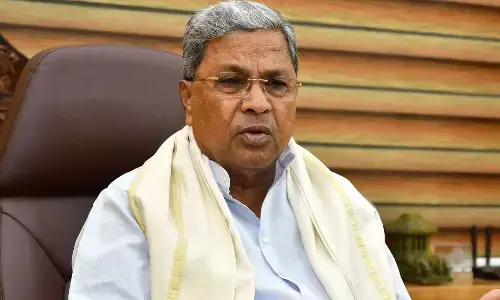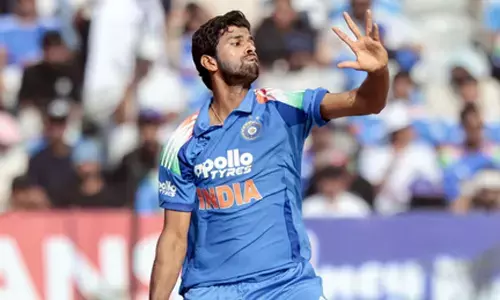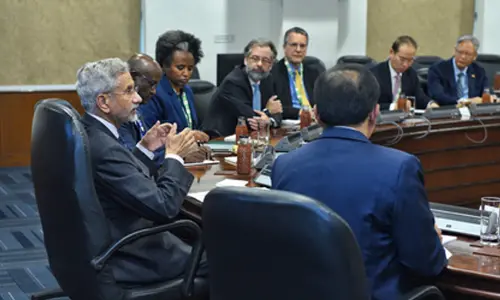MyVoice: Views of our readers 17th April 2022
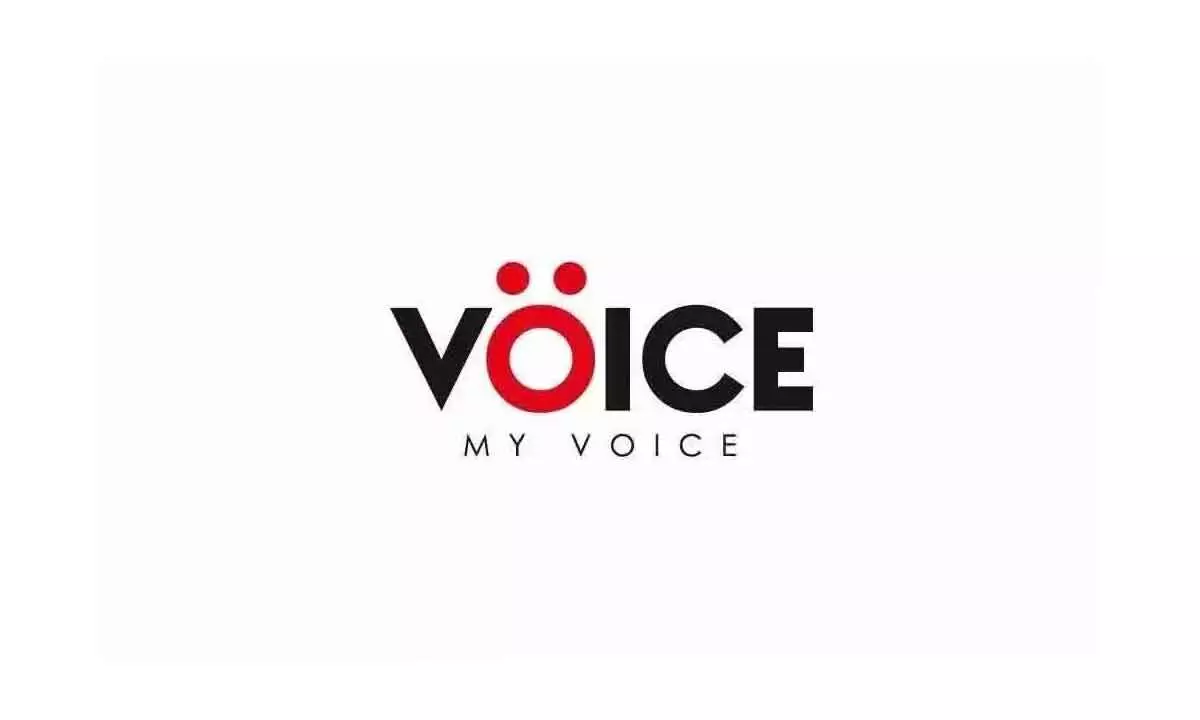
MyVoice: Views of our readers 17th April 2022
MyVoice: Views of our readers 17th April 2022
Farmers will bide their time, decide whom to vote for
The central point becomes the farmer to all political parties at the national and state levels. As we have witnessed the agitation by the ruling and opposition parties in Telangana state the name of the farmers. Every party feels that they are safeguarding the farmer's interest and wants the farmer's sympathy for their party.
Farmers are confused in Telangana State about whom they have to believe. What they want is their genuine demand is procuring of their rice and they least bother the reality. It is being the state's responsibility to address their issues amicably with the centre. Both state and central governments are playing with the sentiments of the farmers.
The prolonged agitation of paddy procurement in Telangana State by the ruling and opposition parties about boiled rice finally ended with relief to the paddy farmers. The TRS party including all its MPs ,MLA,MLC's , Ministers, Chairpersons, ZP chairmen protested at Delhi along with the support of Bharatiya Kisan Union (BKU) Kisan Leader Rakesh Singh Tikait knowing fully well that the Centre cannot buy the boiled rice and just wanted to showcase their political talents to the entire country.
The TRS Government wanted to show the entire country after achieving Statehood they could produce surplus crop which will be the result of better irrigation facilities and could change the from dry lands to wetlands as we see in the coastal Konaseema region of Andhra Pradesh. We know KCR is an astute politician and he doesn't want to give any scope to the BJP and wanted to target BJP for everything hindering development of Telangana State.
The BJP claims that because of their Raithu Deeksha agitation only KCR has finally taken a step back and announced to procure boiled rice and they are claiming that it's a BJP victory. On the other hand, Congress has also claimed that because of their agitation the present KCR government has no option to buy the boiled by giving a good price as they signed on memorandum of Understanding (MoU) which clearly says that the Centre will not buy the boiled rice and willing to purchase raw rice in both Kharif and Rabi season. Congress has projected very well the mistakes done by the present TRS Government.
Every political party claims that they are the pro-farmer parties in reality no-political party cannot exist without farmer support. The farmer knows pretty well about the strategy of all political parties. Finally, we can say that the farming community will be always the winners and will teach a befitting lesson to the political parties who play with their lives and livelihood. The sacrifices made by the farmers will be remembered forever their present success can be attributed to them. The farmers are deciding factor, and whichever political party they wish they can bring that party into power.
— Kanagiri S N Prasad, Hyderabad
Has Akbaruddin escaped lightly?
It's a wonder of wonders that Akbaruddin Owasi has been exonerated by court stating that the court has insufficient evidence against the accused . It is evident that the KCR government deliberately delayed the vital issue and the police authorities under clear instructions of government took their own time to submit the charge sheet in a casual manner and the case has been intentionally diluted by police with the command received from the government.
The most vicious, caustic and unprovoked comments made by Akbaruddin against the majority religion in a public meeting was heard by lakhs of people and the videos and audios are shown by electronic media. This clearly establishes the KCR's bonhomie with minorities and his appeasing method is exposed thread bare . Being a born Hindu and often doing Yagnas and yagas KCR seems to have no respect for his own religion and many a time has commented against the BJP for favouring Hindus and stamped it as Hindutva party. Had he been given freedom to police to deal with the case basing on the merits of case , Akbaruddin would have been awarded punishment by court and the police obviously toe the line of government and submitted an ambiguous and weak charge sheet with an intention to save Akbaruudin from the clutches of sure punishment .
What bigger sacrilege is there for KCR government than this ? All Hindus were shell shocked at his bias shown towards minority community by KCR just for votes. Our memory is not short, all Hindus are keenly watching his wily ways and the injustice done to majority community. Certainly majority community takes revenge against his party by voting against TRS in next assembly elections. Justice in this case is not only delayed but also denied.
— Ramakana M, Kakinada
Indo-Pak relations will stay tense
Pakistan Prime Minister Imran Khan's tantrum prior to his quitting office, showed how immature Pakistan's elected members are, and their respect for the Constitution; and the vulnerability of democracy in that country. The assertive role played by the judiciary surely proved a saving grace in shoring up ideals of democracy, and reminded an elected government of its responsibility, helping the Opposition to correct the situation and bring rational governance on the rail.
The judiciary in Pakistan was not that robust earlier as it played to the tune of the military junta of the country, most of the time, and even though it had taken a sane view of the civic issues at times, it was overruled by the military. The landmark verdict by Pakistan's Supreme Court unanimously struck down the National Assembly deputy speaker's decision to reject a no-confidence motion against Imran Khan Government; and asked PTI to prove its majority on the floor of the House.
The assumption of the combined opposition was to assume power in the wake of Imran's PTI falling short of majority, which was a foregone conclusion. It is sheer providence that the country's military did not intervene this time around to usurp power in Pakistan, which was the usual case in the country in a similar situation. But, the country's military did not subscribe to Imran's foreign hand in trying to unseat him, and even warned Imran to abide by the court verdict to strengthen democracy in Pakistan, which is seen as an unusual change of heart on part of the Pakistani military, which might have given worse rule compared to an elected government in Pakistan.
It is foolish to believe that Indo-Pak ties will change dramatically by the entry of a new Prime Minister in Pakistan. He is a known hawk as any of his predecessors, to be more focussed about India, that channelizing resources for the improvement of Pakistan and its people. It goes without saying that Kashmir fixation is on the top of every leader, even though they know pretty well that Jammu and Kashmir is an unalienable of part of India.
— S Lakshmi, Hyderabad
UGC move not without its problems
The University Grants Commission's (UGC) decision to allow students to purse two undergraduate or postgraduate degrees/diplomas simultaneously in the physical, online or combination modes is in line with the National Education Policy's principle of eliminating silos in education. The decision widens opportunities for students in higher education. On the other hand, it poses several challenges. How students, teachers and those involved in education respond to this move is very important.
There is no denying the fact that courses must give students scope for employability. Indian education system has always been criticised for its limited scope for employability. In contrast to traditional courses, vocational courses provide more job opportunities. However, traditional courses have their own importance. The UGC's move gives equal importance to traditional and vocational courses. As students are allowed to pursue degree/diploma courses from two different universities or the same university, they will gain greater exposure. It also enables students to compare the courses of different universities. Besides, teaching and learning will become more student-oriented. Since physical and online modes of learning are allowed, students are free to join courses of their choice. Given that there are many drawbacks in the present higher education system, radical changes are needed to meet the challenges of the present time. While the UGC's move is commendable, the challenges it pose need to be dealt with. To begin with, doing two courses simultaneously is strenuous. Secondly, when dual degrees become a prescribed qualification for jobs, those who fail to pursue dual degrees will not get opportunities. Thirdly, when students pursue two courses, the issue of attendance may arise. Fourthly, there are concerns about certainty of acquiring deep knowledge in two different subjects. Despite the challenges the UGC's move poses, the dual degree system has a lot of positives. There must be proper planning in its implementation so that it does not affect students' future.
— Venu G S , Kollam
Jewel thief of Pakistan?
Nemesis seems to be dogging Imran Khan these days. Ever since Imran Khan came to don the mantle of Prime Minister, he became too big for his boots and involved in owning a panoply of things. Remarkably, Imran Khan who knew that his sway over his people began to diminish and his charismatic charm lost its sheen causing him to be a persona non grata. Meanwhile, he played some cheap gimmicks like mobilising people on thoroughfares to chant slogans for Khan, which unfortunately fell flat.
Realizing that all of his plans came a cropper, he employed Bukhari to decamp with the money collected from selling the necklace. It was improper on the part of Khan to do so as he was the Premier of a country and not an ordinary person.
— T K Nandanan, Kochi
Hindi should continue to remain an optional language
No other country other than ours has adopted a foreign language as its national language and as a medium of communication. The language conundrum in India is too complex to be resolved as there is no any single language that can bring people of all denominations under a single roof. In India 43.63% of the total population speak Hindi. However, Hindi cannot be imposed as a distinct national language at the cost of ignoring English which enjoys a greater patronage as the official language as well as the medium of instruction. Further, Hindi cannot be adopted as a lone national language of our Indian Union as it faces a staunch opposition especially in the South and the east. In India English has more popularity and patronage as compared to Hindi and such a trend providing greater priority to English has come to be accentuated after IT revolution had swept across the nation.
Hence, the suggestion made by the Union Home Minister during 34th Hindi Divas Day function recently upholding importance to Hindi cannot hold water as it is questionable whether people of all States can unanimously support the idea to replace English with Hindi as such a move cuts across the freedom and choice of all people of our democracy. It would be better to impose the choice of learning Hindi as an optional subject in the school curriculum besides adopting English or mother tongue as the medium of instruction up to the graduate level as per the choice of the students and their parents in order not to jeopardize their interests. But the idea that Hindi should be given a greater priority by ignoring English cannot be an acceptable proposition as such a move is not a step in the right direction and causes an unsavoury upheaval of our system of democracy which is multi-ethnic , multi-religious and multi-lingual in character.
— Bh Indu Sekhar, Hyderabad
China's mala fide intentions on cyberspace
The cyber-espionage campaign that Chinese hackers are reported to be carrying out by targeting the Indian power grid near the disputed India-China border in Ladakh is a reason for concern. According to 'Recorded Future', a private US cybersecurity threat analysis firm, a group of Chinese hackers, which goes by the name 'RedEcho', targeted several vital nodes in India's electricity distribution system in an apparent espionage campaign between August 2021 and March 2022.
The group reportedly used the Trojan malware ShadowPad, which is used by China's People Liberation Army and Ministry of State Security Group. Consequently, the sustained hacking of the Indian power grid is believed to be a Chinese state-sponsored campaign. While Chinese government officials have dismissed the reports, India's Power Minister R K Singh confirmed that "probing attacks" by China were indeed made in the months of December, January and February. He went on to say that India's defences against such attacks are "strong." This time around the hackers may not have been able to do much damage. But past experience shows that Chinese hacking into India's systems is neither benign nor has India always been able to fend off the attacks successfully in the past. In 2020, military tensions along the Line of Actual Control (LAC) in Ladakh began soaring when PLA soldiers entered and occupied territory on the Indian side of the LAC at several points. Parallel to the military intrusions, China began flooding India's power control systems that manage electrical supply across the country with deadly malware. A massive power outage followed in October that year. The power outage forced the shutdown of Mumbai's local trains and its stock exchange. India was then battling its first wave of the Covid-19 pandemic and hospitals had to switch to generators to keep alive thousands of people who were hooked onto the ventilators. Chinese hackers were able to paralyse life in India's commercial capital. Reports of Chinese hacking in recent months indicate that Beijing's targeting of India continues unabated. India must remain alert as Chinese hackers could be pre-positioning malware for a future deadly attack on Indian systems.
During his recent visit to New Delhi, China's Foreign Minister Wang Yi waxed eloquent on the need for the two countries to view the other's development with a "win-win mentality" and called on India to work with China "in the multilateral process with a cooperative posture." How can India take Wang's words seriously and co-operate with China when Beijing is quietly sabotaging India? If China wants to build a peaceful relationship with India, its actions must reflect its words.
— N Sadhasiva Reddy, Bengaluru



